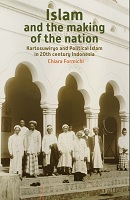Islam and the making of the nation: Kartosuwiryo and political Islam in twentieth-century Indonesia
Author(s)
Formichi, Chiara
Collection
OAPEN-NLLanguage
EnglishAbstract
For decades, scholars of Indonesia have rejected the religious claims of the Darul Islam movement, interpreting the antagonism between the Islamic state and Soekarno’s republic as a fight for power, self-assertion, or land rights. Recently Kartosuwiryo and the Darul Islam have become heroic symbols of the local Islamist struggle, offering an alternative vision of this politician. The author looks beyond this dichotomy between rebel and martyr to unveil a ‘third’ dimension of Kartosuwiryo—a politician whose legacy has been shaping the role of Islam in Indonesian politics for over fifty years.
In a blend of archival sources, printed material, and oral accounts, the author follows the career and ideology of Kartosuwiryo, nationalist leader of the Sarekat Islam party and later Imam of the Islamic State of Indonesia. Following the trajectory of a political activism that was consistently dedicated to the formation of an independent Indonesian state, the chapters delineate the gradual radicalization of the Islamic party and of Kartosuwiryo’s own ideals from the 1920s until the 1950s.
Focusing on the dialectic between the religious and secular anti-colonial movements, this book explores the failure of political Islam in the mid-1950s; the consolidation of the Pancasila state under Soekarno’s and Suharto’s regimes; the latter’s attempt to co-opt what was left of the Darul Islam in the 1970s; and the re-emergence of political Islam and Kartosuwiryo’s memory in the post-1998 era.
A testament to the relevance of historical enquiry in understanding contemporary politics, Islam and the making of the nation guides the reader through the contingencies of the past that have led to the transformation of a nationalist leader into a ‘separatist rebel’ and a ‘martyr’, while at the same time shaping the public perception of political Islam and strengthening the position of the Pancasila in contemporary Indonesia.
Chiara Formichi (1982) has a PhD from the Department of History of the School of Oriental and African Studies, University of London, in 2009, and she is Assistant Professor in Asian and International Studies at City University of Hong Kong. This monograph was drafted during a post-doctoral fellowship at the Asia Research Institute, National University of Singapore. Her interests include the political history of Indonesia, Islam in Southeast Asia, transnational Islamic movements, and inter-Asian intellectual flows. In addition to several articles, her publications include Beyond Shi’ism: Alid piety in Muslim Southeast Asia (London: I.B.Tauris, 2013), Formichi and Feener eds.
Keywords
nationalism; islam; islamic law; colonial history; indonesia; political islam; islamic reform movements; political development; Darul Islam (Indonesia); Masyumi Party; Netherlands; Sekarmadji Maridjan Kartosuwiryo; Sukarno; West JavaDOI
10.26530/OAPEN_424363ISBN
9789004260467OCN
1030814972Publisher
BrillPublisher website
https://brill.com/Publication date and place
Leiden - Boston, 2012Series
Verhandelingen van het Koninklijk Instituut voor Taal-, Land- en Volkenkunde, 282Classification
History


 Download
Download Web Shop
Web Shop